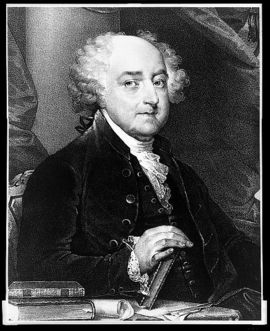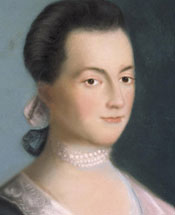John Adams: Difference between revisions
imported>Todd Coles mNo edit summary |
imported>Todd Coles |
||
| Line 23: | Line 23: | ||
===Vice President=== | ===Vice President=== | ||
Adams as the | The role of Vice President was one that Adams didn't settle into easily. His primary job was to serve as President of the Senate, in which his only duty was to cast tie-breaking votes. His relationship with the president was friendly, but Washington rarely asked him for his counsel. All of this was frustrating to Adams, who was a man of action and not shy about letting his opinions be known.<ref name="sah" /> Adams once complained to his wife, "My country has in its wisdom contrived for me the most insignificant office that ever the invention of man contrived or his imagination conceived".<ref name="wh">[http://www.whitehouse.gov/history/presidents/ja2.html White House biography]</ref> However, during his term Adams casted 29 tie-breaking votes, a record that still stands today, including voting to prevent another [[war]] with Great Britain. | ||
However, | |||
===Presidency=== | ===Presidency=== | ||
Revision as of 13:49, 5 November 2007
John Adams (1735-1826) was an American Founding Father, diplomat, and the second President of the United States from 1797-1801. Adams was a prominent figure of the American Revolution. His numerous accomplishments include involvement in the drafting of the Declaration of Independence, writing the constitution for the state of Massachusetts, serving as a diplomat to England, France, and The Netherlands, negotiating the Treaty of Paris, and serving as the first Vice President of the United States under President George Washington.
In the presidential election of 1796, Adams, on the ticket of the Federalist Party, defeated the Democratic-Republican nominee Thomas Jefferson and became the second President of the United States. He served only one term, losing to Jefferson in a bitter rematch known as the Revolution of 1800. His presidency was marked by the Quasi-War between the United States and France, the XYZ Affair, the founding of the U.S. Navy, the passage of Aliens and Sedition Acts, peace with France, and the appointment of John Marshall as Chief Justice.
He was the head of the Massachusetts based Adams political family. Members of the family include his cousin and fellow revolutionary Samuel Adams and his son John Quincy Adams, the sixth U.S. President.
Early Life
John Adams was born in Braintree, Massachusetts on October 19, 1735. He was educated at Harvard College and graduated in 1755. He took a teaching job in Worcester before deciding to study law. He was admitted to the bar in 1758 and practiced law in Suffolk County. In 1761, when his father died, Adams inherited the family farm and became a "freeholder", which enabled him to participate in the local political process. He married Abigail Smith Adams in 1764.[1] He was influenced by the revolutionary lawyer James Otis, from whom he adopted some of his revolutionary thoughts, but he focused mainly on local politics until the passage of the Stamp Act of 1765, which he opposed vigorously.[2]
Political Career
American Revolution
Adams stood against Stamp Act passed by the British Parliament and joined the Sons of Liberty. He participated in the Massachusetts General Court's response to the Act. However, after the Boston Massacre of 1770, Adams served in defense of the British soldiers who conducted the shootings and six of them were acquitted as result.[3] He was a delegate in both the First and the Second Continental Congresses. He also helped the drafting, and was a signer of the Declaration of Independence. During the American Revolution, he went to France and Holland as a diplomat and helped negotiate the peace treaty.
Thomas Jefferson later remarked that Adams was the Declaration of Independence's "pillar of support on the floor of Congress, its ablest advocate and defender."[2] Though Adams in principle opposed the practice of slavery, he remained silent when Jefferson was pressured to strike out a provision in the Declaration that condemned slavery.[1]
John Adams did not attend the U.S. Constitutional Convention in Philadelphia in 1787, due to the fact that he was serving diplomatic duties in London.
Vice President
The role of Vice President was one that Adams didn't settle into easily. His primary job was to serve as President of the Senate, in which his only duty was to cast tie-breaking votes. His relationship with the president was friendly, but Washington rarely asked him for his counsel. All of this was frustrating to Adams, who was a man of action and not shy about letting his opinions be known.[2] Adams once complained to his wife, "My country has in its wisdom contrived for me the most insignificant office that ever the invention of man contrived or his imagination conceived".[4] However, during his term Adams casted 29 tie-breaking votes, a record that still stands today, including voting to prevent another war with Great Britain.
Presidency
The Adams administration was not a tranquil one. The United States fought against France on the sea during the Quasi War. The French Directory refused to meet with American envoys and suspended commercial relations. In 1798, the French demanded American diplomats to pay bribes in order to see the French Foreign Minister Talleyrand, which the diplomats rejected. This incident was known as the XYZ affair. Nationalist sentiment soon became overwhelming in the United States, causing the Congress to authorize more naval troops.[4] Adams also reluctantly signed the Alien and Sedition Act as a wartime measure.
In 1799, however, his friendly response to French peace overture angered hardline Federalists such as Alexander Hamilton, leading to an intraparty chasm. Hamilton attacked Adams for his "ungovernable indiscretion" and "distempered jealousy".[2] This, plus the unpopularity of the Aliens and Sedition Act, led to Adams' electoral defeat to Jefferson in the 1800 presidential election.
Supreme Court appointments
John Adams appointed three justices to the Supreme Court. They are Bushrod Washington, who was George Washington's nephew, Alfred Moore, and Chief Justice John Marshall, who was instrumental in initiating the process of judicial review.
Later life and legacy
Adams largely retired from politics after stepping down from the White House. In 1820, however, he served as a delegate to the constitutional convention of Massachusetts. He resided in Quincy, Massachusetts in his later life and died there on July 4, 1826.
The naval ship USS John Adams SSBN620 was named after John Adams.
References
Notes and citations
- ↑ 1.0 1.1 Hromatko, Wesley. John Adams. Unitarian Universalist Historical Society.
- ↑ 2.0 2.1 2.2 2.3 U.S. Senate Art and History biography
- ↑ Boston Massacre - 1770
- ↑ 4.0 4.1 White House biography

